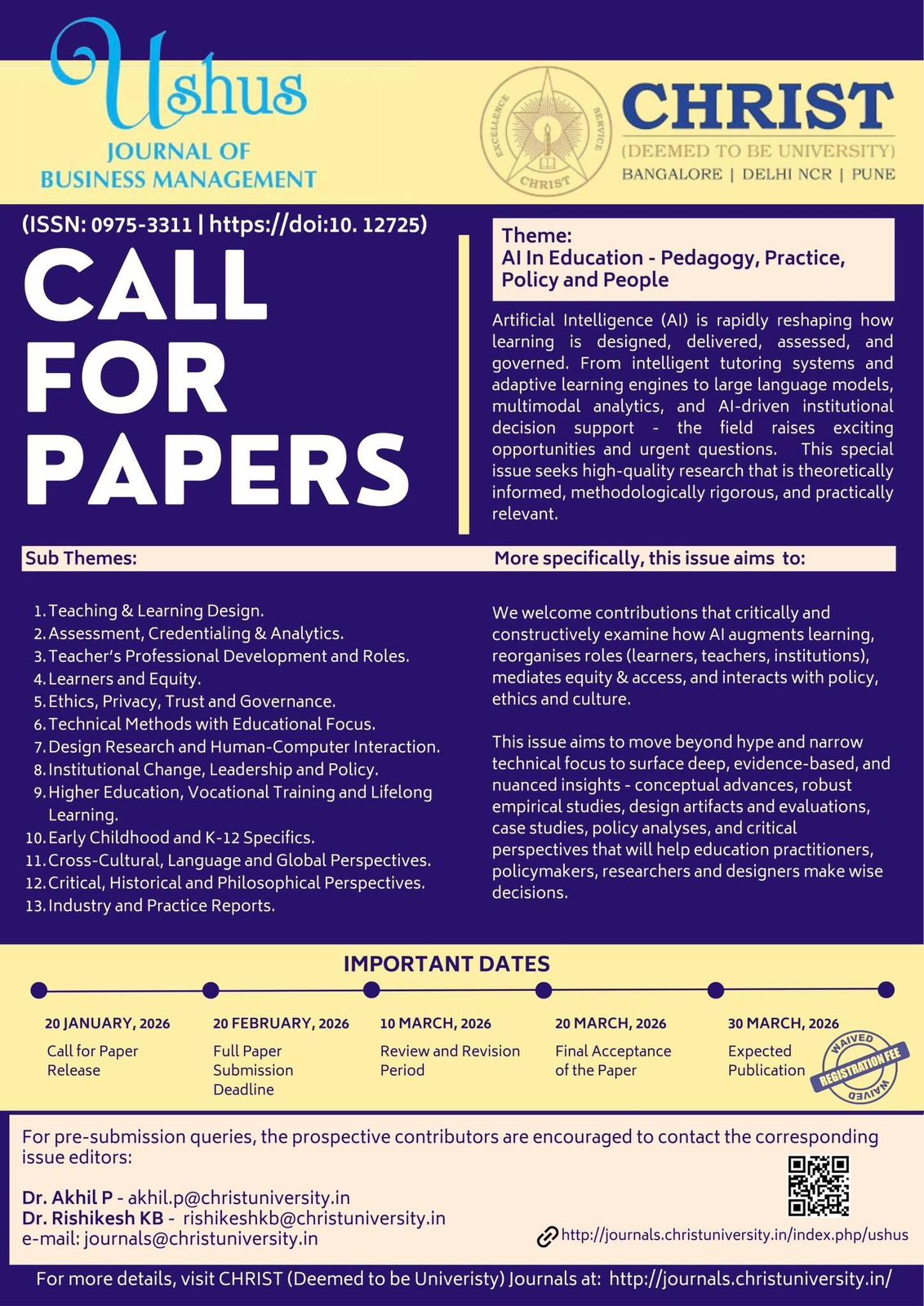Examining Factors Affecting Employee Turnover Intention in Small and Mid-Sized Information Technology Organisations
Turnover Intention
DOI:
https://doi.org/10.12725/ujbm.66.1Keywords:
talent management, turnover engagement, organisation, technology, job satisfaction, retention, leadershipAbstract
This abstract explores the pivotal success factors within the Indian Information Technology (IT) industry, focusing on human resources, strategic planning, and governmental policies. The rapid expansion of the Indian IT sector has led to a growth in the IT talent pool, significantly influencing the trajectory of IT organizations. The critical elements of talent attraction, management, and retention play a central role in shaping the future of these organizations. Talent management, a cornerstone organizational function, encompasses recruiting individuals for specific roles, fostering their growth, and empowering them to achieve organizational goals. Recognizing employees as valuable assets is essential, as their treatment fundamentally defines organizational success. Elevated employee engagement establishes positive emotional connections, fostering passionate contributors, innovative problem-solving teams, superior coordination, and enhanced employee well-being.
References
Abraham, R. (1999). The impact of emotional dissonance on organizational commitment and intention to turnover. Journal of Psychology: Interdisciplinary and Applied, 133(4), 441–455. https://doi.org/10.1080/00223989909599754
Amah, O. E., & Oyetuunde, K. (2020). The effect of servant leadership on employee turnover in SMEs in Nigeria: the role of career growth potential and employee voice. Journal of Small Business and Enterprise Development, 27(6), 885–904. https://doi.org/10.1108/JSBED-01-2019-0009
Beeck, J. W. (2014). The Impact of the Financial and Economic Crisis on Turnover Intention in the U.S. Federal Government. Public personnel management.
Decha Dechawatanapaisal, (2018) "Examining the relationships between HR practices, organizational job embeddedness, job satisfaction, and quit intention: Evidence from Thai accountants", Asia-Pacific Journal of Business Administration, https://doi.org/10.1108/APJBA-11-2017-0114.
Deloitte. (2021). Impact Report 2020-21. https://www2.deloitte.com/content/dam/Deloitte/dk/Documents/about-deloitte/Impact_Report_20_21_web.pdf
Duan, X., Ni, X., Shi, L., Zhang, L., Ye, Y., Mu, H., Li, Z., Liu, X., Fan, L., & Wang, Y. (2019). The impact of workplace violence on job satisfaction, job burnout, and turnover intention: The mediating role of social support. Health and Quality of Life Outcomes, 17(1), 1–11. https://doi.org/10.1186/s12955-019-1164-3
Engelbrecht, A. S., Heine, G., & Mahembe, B. (2014). The influence of ethical leadership on trust and work engagement: An exploratory study. SA Journal of Industrial Psychology, 40(1), 1–10. https://doi.org/10.4102/sajip.v40i1.1210
Eric Ng Chee Hong, L. Z. (2012). An Effectiveness of Human Resource Management Practices on Employee Retention in Institute of Higher learning: - A Regression Analysis. International Journal of Business Research and Management (IJBRM), Volume (3): Issue (2).
Harris, C. M., Lavelle, J. J., & McMahan, G. C. (2020). The effects of internal and external sources of justice on employee turnover intention and organizational citizenship behavior toward clients and workgroup members. International Journal of Human Resource Management, 31(17), 2141–2164. https://doi.org/10.1080/09585192.2018.1441163
Heslin, P. A. (2010). Mindset and employee engagement: theoretical linkages and practical interventions. Book chapter.
Hobfoll, S.E. (1989), "Conservation of resources: a new attempt at conceptualizing stress", The American Psychologist, 44 (3), 513-524.
Hobfoll, S.E. (2001), "The influence of culture, community, and the nested self in the stress process: advancing conservation of resources theory", Applied Psychology: An International Review, 50(3), 337-370.
Hussain, S. A. (2012). Is Employees' Turnover Intention Driven By Organizational Commitment and Perceived Organizational Support ? Journal of Quality and Technology Management, VIII(II), 1–10.
Jaros, S. J. (1997). An assessment of Meyer and Allen's (1991) three-component model of organizational commitment and turnover intentions. Journal of Vocational Behavior, 51(3), 319–337. https://doi.org/10.1006/jvbe.1995.1553
Ketkaew, C., Manglakakeeree, O., & Naruetharadhol, P. (2020). The interrelationships of work-related factors, person-environment fit, and employee turnover intention. Cogent Business and Management, 7(1). https://doi.org/10.1080/23311975.2020.1823580
Kim, S. S., Gil, M., & Kim-Godwin, Y. (2020). Development and Validation of the Family Relationship Assessment Scale in Korean College Students' Families. Family Process, x(x), 1–16. https://doi.org/10.1111/famp.12559
KPMG. (2020). CIO industrial manufacturing survey 2020. KPMG. https://kpmg.com/xx/en/home/insights/2021/02/cio-industrial-manufacturing-survey-2020.html
KPMG. (2020, April). India: Government and institution measures in response to COVID-19. KPMG. https://kpmg.com/xx/en/home/insights/2020/04/india-government-and-institution-measures-in-response-to-covid.html
Kulkarni, R. (2020). Keeping pace with the future: An HR's roadmap. People matter.
Lee, G. R., Fernandez, S., & Lee, S. (2020). An Overlooked Cost of Contracting Out: Evidence From Employee Turnover Intention in U.S. Federal Agencies. Public Personnel Management. https://doi.org/10.1177/0091026020944558
Lee, T. W., & Mitchell, T. R. (1994). An alternative approach: The unfolding model of voluntary employee turnover. Academy of Management Review, 19(1), 51-89.
Mitchell, T.R., Holtom, B.C., Lee, T.W., Sablynski, C.J. and Erez, M. (2001), "Why people stay: using job embeddedness to predict voluntary turnover", Academy of Management Journal, 44( 6), 1102-1121.
Mobley, W. H. (1977). Intermediate linkages in the relationship between job satisfaction and employee turnover. Journal of Applied Psychology, 62(2), 237–240. https://doi.org/10.1037/0021-9010.62.2.237
Ng, T. W., Eby, L. T., Sorensen, K. L., & Feldman, D. C. (2005). Predictors of objective and subjective career success: A meta-analysis. Personnel Psychology, 58(2), 367-408.
Okolocha, C. B., & State, A. (2020). Influence of Employee-Focused Corporate Social Responsibility and Employer Brand on Turnover Intention. European Journal of Business and Management, 12(9), 53–61. https://doi.org/10.7176/ejbm/12-9-07
Oliveira, A., Moro, S., & Torres, P. (2019). Psychological Contract, Internal Branding and Employee Turnover in an IT Company. Academic Journal of Interdisciplinary Studies, 8(1), 9–18. https://doi.org/10.2478/ajis-2019-0001
Oruh, E. S., Mordi, C., Ajonbadi, A., Mojeed-Sanni, B., Nwagbara, U., & Rahman, M. (2020). Investigating the relationship between managerial employment relations and employee turnover intention: The case of Nigeria. Employee Relations, 42(1), 52–74. https://doi.org/10.1108/ER-08-2018-0226
Price, E. L. (2003). The psychology of change management. McKinsey & Company. Retrieved from https://www.mckinsey.com/business-functions/organization/our-insights/the-psychology-of-change-management
Ramlawati, R., Trisnawati, E., Yasin, N. A., & Kurniawaty, K. (2021). External alternatives, job stress on job satisfaction and employee turnover intention. Management Science Letters, 11, 511–518. https://doi.org/10.5267/j.msl.2020.9.016
Sajid Masood, Ghazal Khalid Siddiqui, Huma Lodhi, & Shaista Shahbaz. (2020). Effect of Leadership Styles on Organizational Citizenship Behavior and Employee Turnover Intention. Journal of Accounting and Finance in Emerging Economies, 6(2), 487–495. https://doi.org/10.26710/jafee.v6i2.1200
Sanjeev, M. A. (2014). COMMITMENT : nt. 6(4), 40–56.
Satyaningrum, D. I., & Djastuti, I. (2020). Relationship between emotional labor, work stress, employee creativity, and turnover intention: a study on Indonesian bank front liners. Diponegoro International Journal of Business, 3(1), 1–16. https://doi.org/10.14710/dijb.3.1.2020.1-16
Tuttle, J. L. (1986). Employee Turnover: A Meta-Analysis and Review with Implications for Research. Academy of Management Review.
Downloads
Published
How to Cite
Issue
Section
License
Copyright (c) 2024 Sandhya K S

This work is licensed under a Creative Commons Attribution-NonCommercial-NoDerivatives 4.0 International License.



